Understanding Parrot Pellets: A Complete Guide
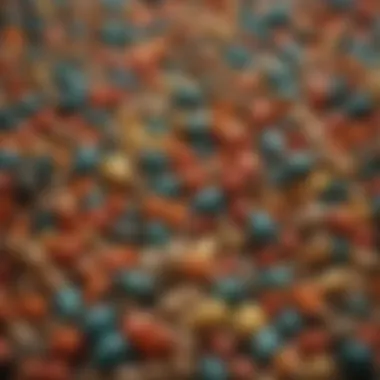
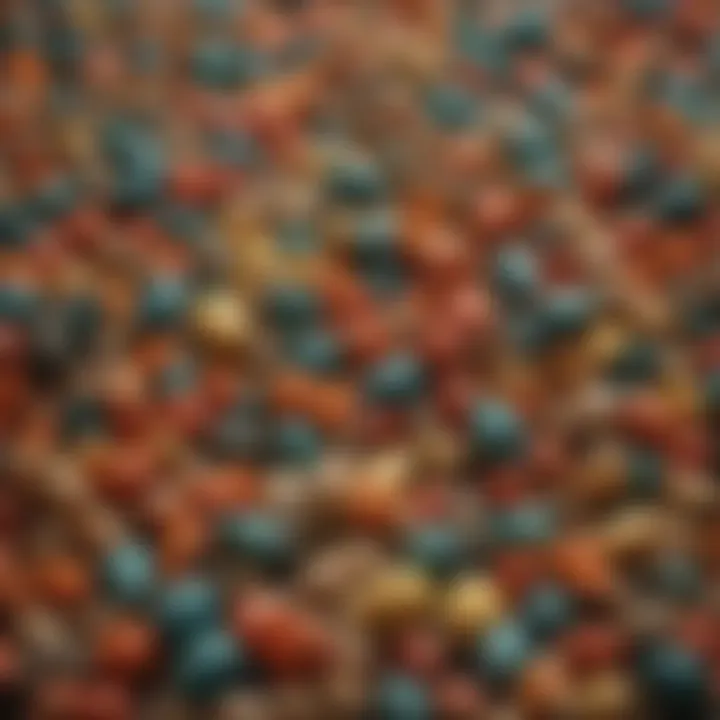
Intro
Parrot pellets are becoming increasingly popular among bird owners as a primary option for avian nutrition. Knowing what these pellets consist of and how they contribute to a parrot's diet is crucial for ensuring optimal health. This guide explores various facets related to parrot pellets, from their nutritional value to practical feeding strategies that align with your pet's needs.
Understanding parrot pellets goes beyond just knowing they exist. It requires a grasp of their composition, the potential benefits they offer, and any drawbacks that may be present. It is equally important to compare them with alternative dietary choices, such as seeds and fresh fruits. Through this examination, pet owners can make well-informed decisions, enhancing their feathered companions' overall well-being.
In the following sections, we will dive into pet care fundamentals, nutrition specifics, and practical advice on introducing these pellets into your parrot's diet. This guide aims to empower pet owners by clarifying common misconceptions and equipping them with the knowledge to optimize their pets' feeding routines.
Understanding Your Pet
A well-rounded understanding of your parrot is essential when it comes to feeding them. This section will cover critical aspects of pet behavior, species-specific needs, and common characteristics that can influence dietary requirements.
Pet Behavior Basics
Understanding your parrot's behavior plays a vital role in ensuring a proper diet. Parrots exhibit various behaviors, influenced by their environments and interactions with their human companions. Recognizing signs of distress, boredom, or anxiety can alert you to the need for a dietary change or enrichment. It’s essential to observe how your pet reacts to its current food and make adjustments accordingly.
Common Breed Characteristics
Different parrot species have unique characteristics that can affect their dietary needs. For example, larger breeds may require more substantial pellets or additional nutrients compared to smaller species. Recognizing these differences ensures that you cater to your pet's specific requirements for a balanced diet.
Species-Specific Needs
Furthermore, it is important to consider the individual needs of various species. Some parrots thrive on high-fat diets, while others might need lower fat levels for optimal health. Conducting thorough research on your specific parrot's nutritional requirements can aid in selecting the right pellets and enriching their diet effectively.
Pet Care and Maintenance
Caring for a parrot goes beyond simply providing food. A comprehensive approach to pet care is crucial.
Feeding Guidelines
When it comes to parrot pellets, following appropriate feeding guidelines is essential. Pellets should generally make up about 70-80% of your parrot's diet, supplemented with fresh fruits, vegetables, and occasional treats. Be mindful of the size of the pellets as well; larger species may need larger pellets, while smaller parrots often do better with smaller ones.
Grooming Essentials
Grooming contributes to your parrot's overall health. Regular feather care, bathing, and nail trimming should not be overlooked. A clean bird is likely to be healthier and can better enjoy their diet.
Hygiene Practices
Maintaining a clean environment for your parrot is crucial. Regular cleaning of food and water dishes helps prevent bacterial growth and keeps your pet healthy.
Health and Wellness
Investing in your parrot's health is essential for lifelong companionship.
Routine Vet Check-ups
Regular veterinary check-ups can help catch any health issues early. They can also provide tailored advice on diet and nutrition based on your bird's health.
Vaccination Needs
Ensuring that your parrot is properly vaccinated can prevent illness and prolong their life. Speak with your avian vet about suggested vaccination schedules.
Recognizing Signs of Illness
Familiarize yourself with the common signs of illness in parrots. Changes in appetite, behavior, or feather condition can indicate health problems that need addressing.
Enrichment and Activities
A well-fed parrot requires mental stimulation and physical activity. Consider including a variety of enrichment activities.
Indoor vs.
Outdoor Activities
Whether indoors or outdoors, providing opportunities for play and exploration is key. Indoor activities can include toys and puzzles, while outdoor activities can include safe, supervised time in natural settings.
Interactive Toys and Games
Interactive toys can challenge your parrot mentally, encouraging use of skills for foraging and problem-solving. This not only keeps them engaged but can also support good mental health.
Socialization Opportunities
Parrots are social creatures. Regular interaction with their owners or other birds can enrich their lives and prevent behavioral issues that can arise from boredom or loneliness.
Preface to Parrot Pellets
Parrot pellets play a crucial role in the diet of pet birds. As avian nutrition becomes more understood, these specially formulated foods are designed to provide balanced nutrition for parrots of all sizes. The complexity of a parrot's digestive system requires more than just seeds and fruits; they need a variety of nutrients to thrive. This section will delve into the definition of parrot pellets, their historical context, and their significance in maintaining a healthy diet for pet birds.
Definition of Parrot Pellets
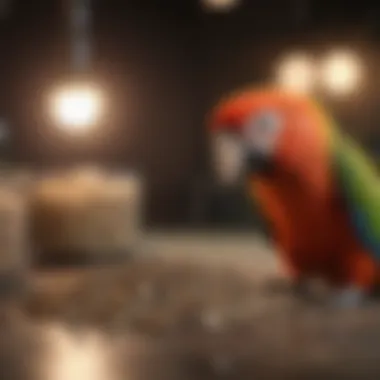
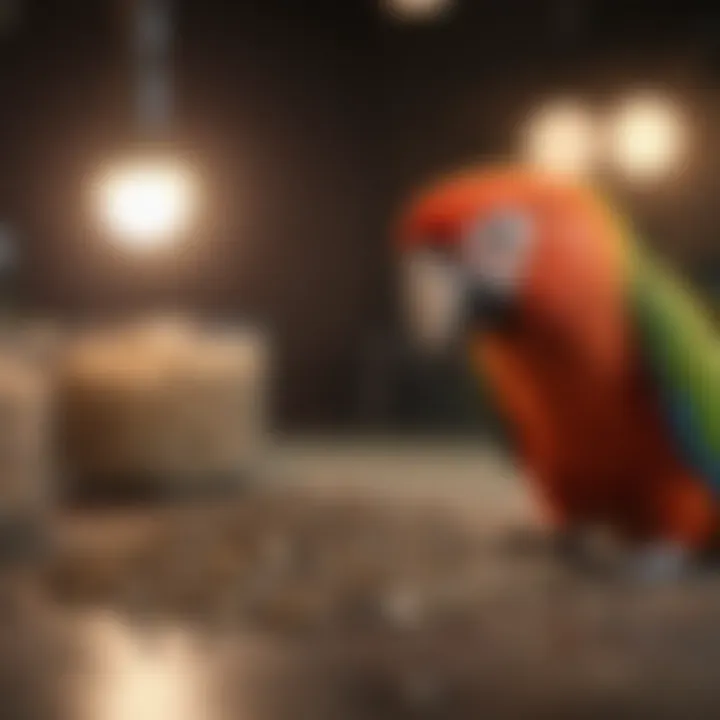
Parrot pellets are compact food items specially manufactured for feeding parrots. They come in various shapes, colors, and formulations. The primary goal of these pellets is to provide a nutritionally balanced diet, imitating the diverse foods parrots might find in the wild. Unlike traditional seed mixes, where a parrot may selectively eat only the favorites, pellets ensure that the bird receives essential vitamins, minerals, and other nutrients needed for its overall health.
Historical Context
The evolution of parrot pellets originated from a growing awareness of birds' dietary needs. In the past, many parrot owners relied solely on seeds, which lacking in essential nutrients. Recognizing this gap, experts in avian nutrition began to develop pellets in the late 20th century. The formulations have been refined over time to incorporate various ingredients, including grains, vegetables, and fruits, designed to meet the specific nutritional demands of various parrot species. Today, pellets are widely recognized and recommended by veterinarians as a primary component of a parrot's diet, paving the way for healthier, happier avian companions.
Nutritional Composition
Nutritional composition is a vital aspect of understanding parrot pellets. It refers to the balance of essential nutrients that contribute to the overall health and well-being of parrots. Knowing what these pellets contain helps pet owners make informed decisions. The right nutrition is key in enhancing the quality of life for these birds. Pellets should deliver a variety of vitamins, minerals, proteins, and fats. This ensures a balanced diet. Failing to provide adequate nutrition can lead to various health issues.
Key Nutrients
Vitamins
Vitamins play a crucial role in a parrot's diet. They are necessary for various bodily functions. These functions include immune response, metabolism, and overall growth. For example, Vitamin A supports vision and immune health. Vitamin D aids in calcium absorption. A diverse range of vitamins provides specific health benefits.
One notable feature of vitamins is their essential nature. Birds cannot synthesize these nutrients; they must obtain them from their diet. This characteristic underscores the importance of choosing high-quality pellets that are rich in vitamins. If neglected, vitamin deficiencies can cause serious health concerns.
Minerals
Minerals are also indispensable for parrot health. They contribute to functions such as bone formation, muscle contraction, and nerve signaling. Key minerals include calcium, phosphorus, and potassium. Calcium is particularly significant as it helps maintain strong bones and proper heart function.
The unique feature of minerals is their involvement in structural roles, alongside their functional roles. They must be present in the diet in appropriate amounts. A lack of minerals can lead to skeletal deformities and other health issues in parrots. This makes it critical to read ingredient labels carefully to ensure seamless mineral integration into a bird’s diet.
Proteins
Proteins serve as building blocks for cells and tissues in a parrot's body. They are essential for growth, repair, and maintenance of bodily functions. A good diet should have a varied protein source, which may include soybeans, lentils, and other legumes.
The key characteristic of proteins is their ability to support muscle health and repair. This is crucial, especially for active parrots. Moreover, not all proteins are created equal. A balanced protein source from quality pellets will provide necessary amino acids. Inadequate protein levels can lead to weakness and impaired growth in parrots. Therefore, evaluating protein content is important for dietary planning.
Fats
Fats provide energy and are crucial for the absorption of fat-soluble vitamins. They also play a role in keeping skin and feathers healthy. Quality sources of fats include seeds, nuts, and certain oils. These fats are beneficial as they contribute necessary fatty acids to the diet.
However, the unique point about fats is balancing calorie intake. Excess fat can lead to obesity, which poses risks to a parrot's health. Thus, while including fats in the diet, moderation needs to be considered. A thoughtful approach to fat content can help regulate energy levels in active birds.
Ingredient Analysis
Grains
Grains form an important base in many parrot pellets. They serve as a source of carbohydrates, which are necessary for energy. Common grains include corn, wheat, and oats. Many birds find these ingredients palatable, making grains a popular choice.
Grains are primarily advantageous due to their energy provision. They also offer fiber, which is helpful for digestive health. However, not all grains are equal. Some may be more nutritious than others. Increased reliance on certain grains can lead to imbalances.
Fruits
Fruits offer natural sugars and are an excellent source of vitamins. They can be included in pellet formulations or served fresh. Common fruits for parrots involve apples, bananas, and berries. Their vibrant colors often attract birds, making them enjoyable treats.
The key characteristic of fruits is their high vitamin content. They are also a source of antioxidants. This can promote better immune function. While fruits are nutritious, they must be offered in controlled amounts due to sugar content.
Vegetables
Vegetables complement a parrot's diet well. They add fiber, vitamins, and minerals. Leafy greens like kale and dark green veggies, such as broccoli, offer numerous benefits. These foods are vital for hydration as well.
The unique feature of vegetables is their diversity. A wide range ensures that various nutrients are made available. It is necessary to incorporate a variety of colors and types to achieve this. However, some parrots may be picky with vegetables. Careful introduction and presentation can help increase acceptance in their diet.
Types of Parrot Pellets
Understanding the different types of parrot pellets is critical for pet owners as it enables informed decisions regarding their birds' nutrition. With varying formulations available, each type serves unique benefits and fits distinct needs. This section explores the differences between commercial and homemade pellets, alongside a comparison of popular brands. This insight will guide pet owners in choosing the best option for their feathered companions.
Commercial vs.
Homemade Pellets
Commercial pellets are mass-produced and readily available in pet stores or online. These products commonly cater to a broad spectrum of avian needs. They are developed based on nutritional research and typically contain a variety of vitamins, minerals, and other essential nutrients. One key advantage of commercial pellets is their convenience. Owners can easily find them and do not have to worry about ratios or ingredient sourcing.
In contrast, homemade pellets are crafted by the owner, often allowing customization to fulfill specific dietary requirements. However, making pellets at home requires knowledge and understanding of avian nutrition to ensure a balanced diet. Pet owners venturing into this route should pay attention to the ingredient proportions, as an unbalanced mix could lead to nutritional deficiencies or excesses. Some potential benefits of homemade pellets include increased freshness and potentially fewer preservatives. However, ensuring consistency in nutritional value can be challenging.
Considerations
- Convenience: Commercial pellets win in ease of access and preparation.
- Customizability: Homemade pellets allow tailored nutrition.
- Nutritional Balance: Commercial brands are designed based on nutrient requirements, while homemade versions need careful crafting.
Brand Comparisons
When evaluating various brands of parrot pellets, it is essential to recognize that not all products are created equal. Some brands focus heavily on using high-quality, wholesome ingredients while others may cut costs by using fillers or low-quality components. Consequently, pet owners must scrutinize ingredient lists and nutritional analyses.
A few popular brands include:
- Harrison's Bird Foods: Known for its organic ingredients and focus on avian health. Their products often contain fewer fillers and more nutrients.
- Zupreem: Offers a diverse range of pellets suited for different species but includes some controversial ingredients.
- Kaytee: Generally budget-friendly, but it has varied nutritional quality across its product line.
Key Factors in Brand Selection
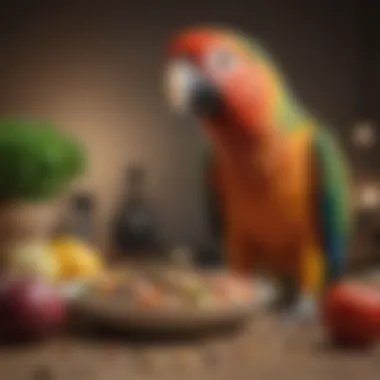
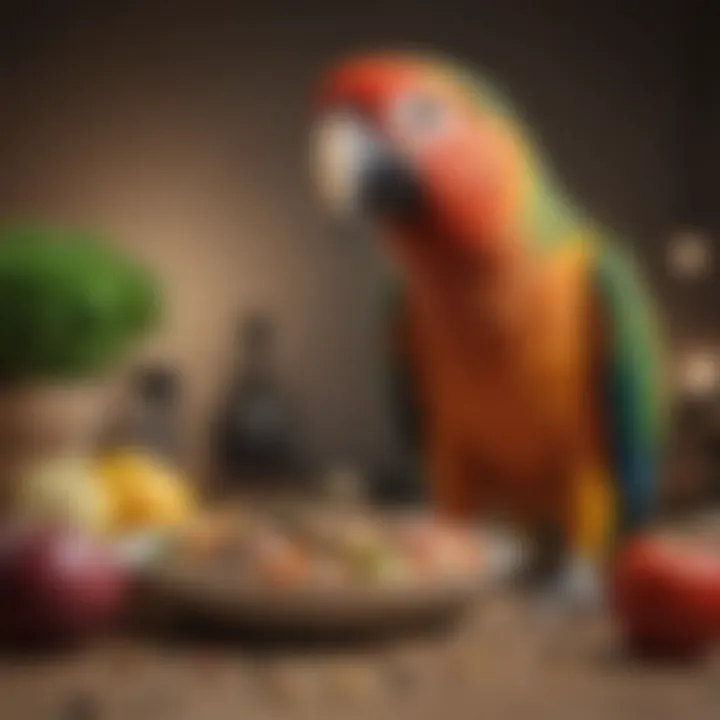
- Ingredient Quality: Always look for whole grains, fresh types of fruits, and vegetables.
- Nutritional Information: Brands should provide detailed nutritional analysis to ensure balanced feeding.
- Reputation and Reviews: Research feedback from other pet owners on their experiences with different brands.
Benefits of Feeding Pellets
Feeding parrot pellets offers a range of benefits that are crucial for the overall health and well-being of pet birds. Understanding these advantages helps pet owners make informed choices about their birds' diets. The significance of feeding pellets lies in the balance they provide, their utility in managing weight, and the practicality they offer in daily feeding routines.
Balanced Nutrition
Parrot pellets are designed to deliver balanced nutrition, which is vital for maintaining a healthy bird. These pellets contain a blend of essential vitamins, minerals, and other nutrients that mimic a balanced diet found in the wild. Since parrots can be selective eaters, they may skip crucial nutrients if they are fed only seeds or other unvaried diets. Pellets reduce this risk by offering a complete nutritional profile.
Ingredient transparency is another notable aspect of many pellets. The high-quality brands list their ingredients clearly, allowing pet owners to understand what is being fed to their feathered friends. Each pellet typically consists of grains, vegetables, fruits, and fortified additives. Such diversity ensures parrots receive vitamins such as Vitamin A, which is essential for vision, and calcium for bone health.
Weight Management
Weight management is a critical concern for many pet owners. Parrots, if overfed with seeds or high-fat diets, can become obese, leading to serious health issues. Pellets can help control caloric intake. They are formulated to be lower in fat compared to many seed mixes, promoting a leaner, healthier body composition for birds.
Regular feeding of appropriate amounts of pellets helps in establishing a routine that promotes healthy eating habits. With proper portion control and the right type of pellets, pet owners can help their birds maintain an ideal weight, consequently reducing the risk of obesity-related complications such as heart disease and joint problems.
Convenience of Use
Convenience represents another significant advantage of parrot pellets. Many pet owners find pellets easier to manage compared to fresh food or seeds. Pellets do not spoil quickly, reducing waste and frequency of purchases. Unlike fresh fruits and vegetables, which may require daily preparation, pellets are ready to serve.
This convenience also extends to storage. Pellets can be stored easily in a dry, cool place without the need for refrigeration, which can be essential for busy households. When traveling, bringing along pellets can ensure that pet birds maintain their diets without the stress of meal prep.
Important Note: Choosing high-quality pellets is essential. Look for brands that prioritize natural ingredients without fillers, artificial colors, or preservatives. Your bird's health depends on the quality of the food you provide.
In summary, the benefits of feeding parrot pellets include not only balanced nutrition and weight management but also the overall convenience in feeding routines. By understanding these advantages, pet owners can ensure their parrots thrive and lead healthy lives.
Common Misconceptions
Understanding the common misconceptions surrounding parrot pellets is crucial for pet owners. These myths can lead to misguided feeding practices, potentially jeopardizing the health of avian companions. By dispelling these inaccuracies, one can make informed decisions regarding their parrots’ nutrition and overall well-being.
Myths about Pellets
Many pet owners harbor several myths about parrot pellets. One prevalent belief is that all parrot pellets are the same. In reality, the ingredients and nutrient profiles can vary significantly between brands. Some pellets may be formulated specifically for certain species, while others may not meet the nutritional needs required by different types of parrots.
Another myth is that pellets can fully replace fresh food. While pellets provide a balanced nutritional base, they should not completely replace fruits and vegetables in a parrot’s diet. Fresh produce offers essential nutrients, trace elements, and natural fibers that pellets may lack.
A common belief is that introducing pellets means birds will stop enjoying their favorite seeds and fruits. In fact, introducing pellets gradually can actually encourage a more diverse diet, as parrots often appreciate variety and may continue to enjoy their other food options.
Pellets vs.
Seed Diets
The debate between pellets and seed diets is ongoing among pet owners and experts alike. Many insist that seeds are a natural diet for birds and argue against the necessity of pellets. However, seed-based diets can often be deficient in crucial vitamins and minerals.
Pellets are designed to provide a complete and balanced diet. They contain the essential nutrients that are generally absent in a seed-only diet. Furthermore, seeds can be high in fat and lead to obesity, a serious health issue in parrots.
Adopting pellets does not mean completely eliminating seeds from a parrot's diet. A mixed diet can promote better health, given that seeds can be offered in moderation alongside pellets and fresh foods. This balanced approach helps ensure that parrots receive a wide range of nutrients.
The choice between pellets and seeds should be based on understanding their nutritional needs and ideally consulting with a veterinarian.
Transitioning to Pellets
Transitioning to pellets is a significant step for any parrot owner. It involves a shift from traditional seed diets to a more balanced and nutritionally optimized food source. Understanding how to effectively make this change is crucial for the health of your feathered companion. The process not only ensures that your bird receives the right nutrients but also promotes better overall well-being. Adapting to pellets can lead to a healthier and longer life for your parrot.
Steps for Successful Transition
Changing your parrot's diet can require patience and a methodical approach. Here are some practical steps to guide you:
- Start Slow: Initiate the process gradually. Mix pellets with the seeds your parrot is used to. Start with a small amount of pellets, ensuring your bird is comfortable with the new texture and taste.
- Observe Preferences: Pay attention to which components your bird prefers. Birds sometimes pick out the seeds and leave pellets behind. Adjust your mixture based on their preferences.
- Offer Fresh Alternatives: Introduce fresh fruits and vegetables alongside the pellets. This provides a variety of textures and flavors, which can encourage your parrot to try the pellets.
- Eliminate Seeds Slowly: Gradually decrease the amount of seeds in the diet while increasing the pellets. This ensures that your parrot does not feel deprived and can adjust comfortably.
- Maintain Consistency: Keep the feeding routine consistent. Birds thrive on routine, and this will help them accept the changes more readily.
Monitoring Acceptance
Once you start the transition, actively monitoring your parrot's acceptance of pellets is essential. Assessing their response helps to identify any challenges and adjust your approach
- Behavior Changes: Keep an eye on how your parrot reacts to the new diet. Are they eating the pellets? Any signs of stress?
- Health Monitoring: Ensure that your bird remains healthy during the transition. Changes in feces or behavioral issues could indicate trouble.
- Weight and Activity Levels: It's important to track your parrot's weight and energy. A healthy bird should maintain a stable weight and be active.
- Consult a Vet: If acceptance is slow or there are signs of discomfort, consulting an avian veterinarian is a prudent step.
By following these guidelines for transitioning to pellets, you can help ensure that your parrot adjusts well to its new diet. Remember, the goal is to promote a nutritious and balanced approach to feeding, enhancing your bird’s long-term health.
Feeding Guidelines
Feeding guidelines are essential for maintaining the health and well-being of your parrot. They help pet owners understand how much food to offer and how to balance that with other dietary components. Proper feeding practices ensure that your bird receives the necessary nutrients for optimal function and vitality. Missteps in feeding can lead to health issues, so understanding these guidelines is key.
Daily Recommended Amounts
Determining the right daily amounts of parrot pellets is crucial. The amount can vary based on the bird's species, age, and individual needs. Most experts recommend that adult parrots receive about 1/4 to 1/2 cup of pellets daily. Young or energetic birds may require more to meet their energy demands. Here are some factors to consider:
- Species: Different parrot species have varying metabolic needs. For example, larger species like Macaws may require a higher volume compared to smaller ones like Budgerigars.
- Age: Young birds often need more food as they are in growth stages. Older birds may need adjustments based on health conditions.
- Activity Levels: Active or breeding birds will typically consume more.
Accurate measurements can be complex, so observing your bird's weight and overall health is important. Regular consultations with a veterinarian help ensure that you provide an appropriate amount.
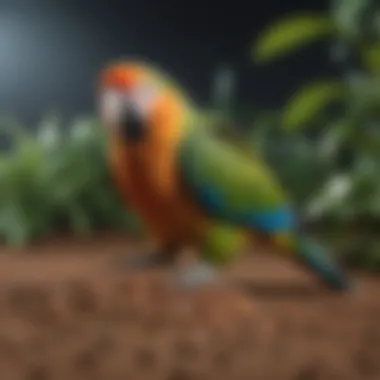
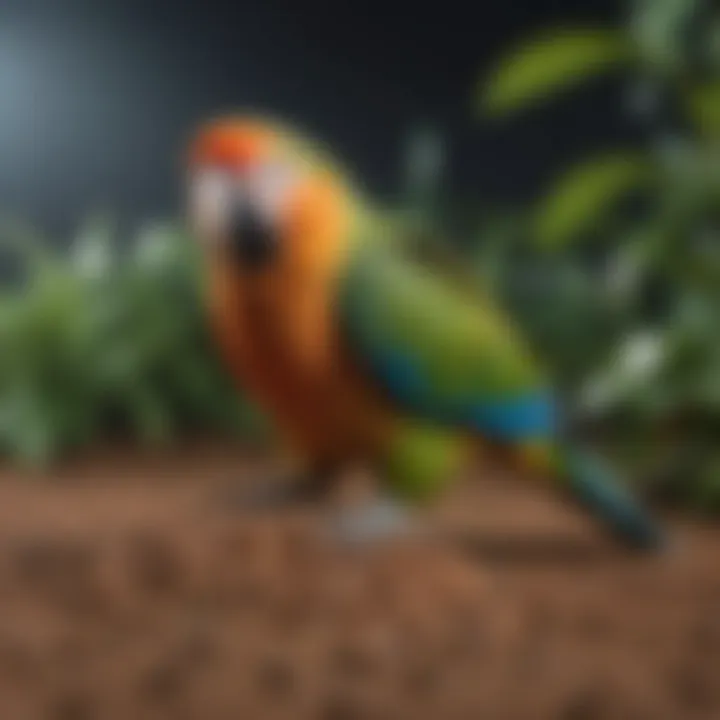
Combining Pellets with Fresh Foods
Integrating pellets with fresh foods can lead to a well-rounded diet. Parrots are natural foragers, so offering them variety keeps meals interesting and stimulating. Fresh fruits and vegetables can complement pellet nutrition. Here are some considerations for combining:
- Nutritional Balance: Combining pellets with fresh produce ensures a wider array of nutrients. For instance, while pellets provide essential vitamins and minerals, fresh foods can offer hydration and additional vitamins.
- Variety in Diet: Including different types of fruits and vegetables keeps your parrot engaged and reduces the risk of developing picky eating habits.
- Transition Gradually: If you are introducing fresh foods, do it slowly. This helps avoid digestive upsets and lets your bird adjust to new flavors and textures.
By following these feeding guidelines, including daily amounts and the integration of fresh foods, pet owners can promote a healthier lifestyle for their parrots. Always monitor your bird’s preferences and health, adjusting their diet as necessary.
Remember, each bird is unique. Consult with avian professionals for tailored advice.
Environmental Considerations
The rise of environmentally conscious choices permeates every aspect of our lives, including pet care. Parrot pellets, while crucial to avian nutrition, also have environmental implications that warrant attention. Understanding these implications allows pet owners to make informed decisions that support ecological responsibility.
Sustainability of Ingredients
Sustainability refers to using resources in a way that meets the needs of the present without compromising the ability of future generations to meet their own needs. In the context of parrot pellets, it involves selecting ingredients sourced responsibly and ethically.
Many commercial pellet brands aim to use sustainable ingredients to contribute positively to the environment. Ingredients like grains, legumes, and various seeds can be farmed sustainably when proper agricultural practices are followed. For example, choosing brands that prioritize local sourcing can reduce transportation emissions and support local economies. Additionally, some companies actively engage in practices that conserve water and soil, helping to maintain ecological balance.
It is crucial for pet owners to scrutinize ingredient lists on pellet packaging. Brands that emphasize organic or non-GMO ingredients often showcase their commitment to sustainability. However, not all companies are transparent about their sourcing practices. Therefore, doing research on specific brands and their ingredient origins can empower pet owners to make better choices.
Packaging Impact
The choice of packaging for parrot pellets can have substantial environmental effects as well. Many products are packaged in plastic that may not be recyclable, leading to increased waste in landfills. On the contrary, brands that use biodegradable or recyclable materials help mitigate these impacts.
The environmental footprint of packaging encompasses not just the materials, but also the production and transportation processes involved. Less packaging can mean fewer resources consumed. Therefore, discerning pet owners may seek pelleted food in bulk options or those that use minimal, sustainable packaging.
"Every small choice contributes to a larger impact. With rising awareness, even the packaging of pet food has become an area where we can enact positive change."
Health Implications
Understanding the health implications of parrot pellets is essential for ensuring the well-being of your pet bird. Pellets can provide a balanced diet, but they also come with specific health considerations that owners must recognize. Knowing about possible allergens and digestive concerns can help pet owners make informed choices.
Potential Allergens
Many commercial parrot pellets may contain allergens that can affect your bird's health. Common ingredients, such as nuts, soy, or certain grains, can trigger allergic reactions in some parrots. Signs of an allergic reaction include feather plucking, skin irritation, or gastrointestinal discomfort.
It is critical for pet owners to scrutinize ingredient lists carefully. If your parrot has a known allergy, consult your veterinarian for guidance on selecting pellets that do not contain those allergens.
- Common allergens in parrot pellets:
- Nuts
- Soy
- Dairy products
- Grains like wheat or corn
By choosing hypoallergenic options, you reduce the risk of adverse reactions. Additionally, consider introducing any new pellet gradually, allowing your bird to adapt while observing for any signs of allergies.
Digestive Concerns
Digestive health is crucial for parrots and directly linked to the type of food they consume. Some pellets may contain high levels of indigestible fibers or fillers that can lead to gastrointestinal issues. It's important to select high-quality pellets that ensure proper digestion.
Symptoms of digestive discomfort can include:
- Diarrhea
- Constipation
- Bloating
Monitoring your parrot's droppings can be an effective way to gauge the impact of their diet. Changes in droppings consistency can indicate issues that may need addressing.
To minimize digestive concerns, consider the following:
- Choose pellets with natural ingredients.
- Combine pellets with fresh fruits and vegetables to ensure a balanced diet.
- Maintain regular consultation with your veterinarian to monitor your parrot's digestive health.
A balanced diet fosters a healthy digestive system and contributes to overall well-being.
By being aware of these health implications and addressing them promptly, pet owners can significantly enhance the quality of life for their parrots.
Expert Recommendations
The section on expert recommendations is crucial in understanding the best practices for feeding parrot pellets. It compiles insights from professionals in avian care, including veterinarians and nutritionists. This guidance is pivotal as it helps pet owners navigate the complexities of avian diets, ensuring optimal nutrition for their parrots.
Veterinary Insights
Veterinarians emphasize the importance of a balanced diet for parrots. They note that parrot pellets, carefully formulated, can supply essential nutrients that birds may not get from a seed-only diet. It's common for avian veterinarians to recommend a specific type of pellet based on the parrot's species, age, and health status. They often assess the individual needs of the bird and adjust dietary recommendations accordingly.
For example, some pellets contain additional probiotics to support digestive health. Vet-recommended brands, such as Harrison's or Roudybush, are frequently mentioned due to their commitment to high-quality ingredients and their comprehensive nutritional profiles. Furthermore, veterinarians stress the importance of transitioning gradually to pellets to prevent digestive upset.
Avian Nutritionists' Views
Avian nutritionists bring a specialized understanding of the dietary needs of parrots. They highlight that not all pellets are created equal, and pet owners should look for those that meet specific nutritional standards. Nutritionists often suggest reading labels carefully to ensure pellets contain a variety of fruits, vegetables, and grains, avoiding those high in sugar or low in fiber.
Moreover, nutritionists advocate for a balanced diet that includes fresh produce alongside pellets. A study has shown that mixing pellets with fresh foods can enhance palatability and provide additional vitamins and minerals. They might recommend specific brands like Zupreem or Kaytee for their well-rounded formulas that cater to different parrot sizes and types.
Finale
In this article, we have explored the multifaceted world of parrot pellets, illuminating their significance in the nutritional landscape of avian care. The critical points about parrot pellets should resonate with all who care for these remarkable birds.
Summarizing Key Points
- Nutritional Value: Parrot pellets are formulated to provide a balanced diet that includes essential vitamins, minerals, proteins, and fats, crucial for a parrot's health.
- Types and Quality: Understanding the differences between commercial and homemade pellets is vital for making informed decisions. The quality of the ingredients plays a significant role in the overall health of the bird.
- Benefits Over Seeds: While seeds have traditionally been a staple, pellets offer a more balanced alternative. They help mitigate issues like obesity and malnutrition.
- Transitioning Process: Successfully integrating pellets into a bird's diet requires a gradual approach. Monitoring acceptance during the transition can lead to better long-term outcomes.
- Expert Recommendations: Consulting with veterinarians and avian nutritionists provides valuable insights and advice tailored to individual birds.







